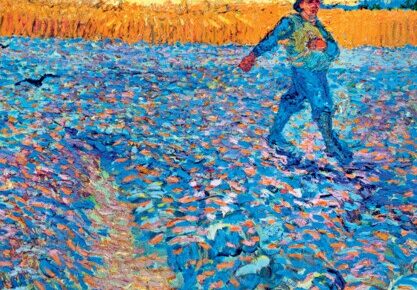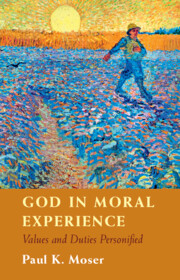
Inquirers about God eventually confront an issue about evidence for God: Is there any salient evidence available to them for God’s reality and goodness? If so, where is it to be found, and how is it to be found? Such questions deserve our careful attention, because their answers have significant consequences for human lives, individually and socially.
God in Moral Experience explains how some content of human moral experience, or awareness, has intentional features indicating God’s reality and goodness. Such experienced moral values as love, joy, peace, patience, and kindness, according to the Apostle Paul, are “the fruit of God’s Spirit.” Developing this theme, the book contends that these values are character, or personality, traits of an intentional God, and when directly experienced, they are direct evidence for the reality and goodness of such a God. They can be such evidence even when humans fail to recognize this distinctive status. In addition, this status is not undermined by their being obscured or diminished by uncooperative human responses or attitudes. If their reality seems meager at best to some people, we should ask what role humans play in its seeming meager.
The book takes human moral conscience to have a significant role in presenting intentional divine action in human experience. This role yields new resilience for religious epistemology and ethics, given its place for direct moral experience of God. In this direct experience, God relates to humans via self-presentation of the divine character traits in the fruit of the Spirit. This divine self-presentation in human conscience is significant evidence of God’s reality and goodness, even though it has been widely neglected by inquirers. It can figure in a best available explanation of a person’s moral experience and thereby gain credibility.
Humans can turn away from the divine self-presentation or they can cooperate with it. The book explores some important consequences of those options. It does so with attention to this issue: Can humans have lives with lasting meaning and value, and, if so, does God have a role in this prospect? This issue is demanding, because it asks about elusive meaning for human life that lasts, and such meaning is dismissed by many inquirers. So, we must ask how God can have a role in lasting meaning.
The book asks what we can reasonably hope for in our lives. It thus asks about groundedhope, that is, hope with adequate reason or support. Such hope is responsible hope, because it is based on our relevant evidence; it thus is not just wishful thinking or guesswork. The book explores what the relevant evidence looks like, in an effort to save us from looking in the wrong places for lasting meaning and value or for God.
A decisive issue is whether a good bearer of lasting purpose and meaning for human lives guides the world, despite human tragedy. We can imagine such a guide, but does anything indicate it to be a reality rather than a fiction? The answer, according to the book, lies in our experience of such values as love, joy, peace, and patience in their guiding power. In this perspective, those values seek to guide us in ways distinctive of God’s moral character, with an aim to build a lasting good society. Such evidence could be right before the eyes of our conscience, while we still overlook it. The book considers how self-awareness in moral conscience bears on apprehending values and duties that challenge us for our good.
Neglecting the values and duties in question results in neglecting God and salient evidence of God’s reality and goodness. God self-reveals in these values and duties, for the intended good of humans. In particular, God self-reveals divine valuing and caring toward humans by means of these values and duties when experienced. In doing so, God intends to persuade humans to cooperate with God, without coercing their wills to comply. God thus aims to have people comply voluntarily with the presented values and duties, in order for them to become worthy beneficiaries and representatives of God’s moral character. God thereby seeks to build a righteous community of God’s people.
A summary of the divine process of persuasion through moral experience is:
(i) a divine interruption in human awareness from presented fruit of the Spirit,
(ii) a divine challenging nudge, in conscience, toward human conformity to this fruit,
(iii) human voluntary cooperation with the convicting challenge to conform,
(iv) the fruit as a divine voucher of its eventual fulfillment in full realization, (v) an eventual divine fulfillment of the fruit at God’s time.
This process shows optimism about lasting goodness for humans. They are not, however, in control of the process, given the centrality of God’s role.
God is often elusive toward humans in order to avoid divine promiscuity, and this feature can be fitting for uncoercive divine work for human good. It can challenge our moral complacency by our experiencing divine absence in contrast with divine presence in our lives. God thus resists being an easy commodity for us. The book considers the value of our conforming to difficult experiences and expectations from God, for our lasting good. This prospect enables us to assess God responsibly on unique divine terms, rather than on distorting terms.
If values and duties for humans are for something, in being directed toward an end, then they can reveal meaning for human life. The book contends that some moral values and duties are goal-directed in this way but not as a result of human intentions. The case begins with human conscience in its challenging some people in a morally good direction, by giving them experience of some values or duties. In presenting kindness and challenging selfishness, for instance, our conscience can nudge us toward unselfishness. We thus can find ourselves convicted, without coercion, toward a moral direction of righteousness in relating to other people. In that regard, we are responsible moral agents, and not pawns determined by outside causes.
The book considers whether some moral values and duties indicate God at work in human moral experience. In particular, do some values and duties represent God’s aiming to guide people toward righteousness and away from unrighteousness? Many inquirers choose not to think of any values and duties as representing a morally perfect agent aiming to do something. Attention to the moral experience of some people, I contend, reveals evidence for a morally good agent aiming to nudge them toward righteousness. The book asks whether the agent in question is human, and considers evidence that it is not. The latter evidence can include firsthand experience of God in human conscience, but we should not infer that conscience is the voice of God. A better view is that God challenges and guides some humans through conscience, with the guidance depending on human cooperation.
The book argues that God would want humans to reciprocate toward God regarding the divine goodness as righteousness shown to them. If that righteousness is self-sacrificing and thus self-giving toward humans, God would want humans to cooperate with that goodness by giving themselves to God in obedience and trust. Such self-giving entails human self-sacrifice to God for the purpose of reflecting God’s morally perfect character of righteousness. In yielding to God, a person allows God’s unique power to come to fruition in a human life, enabling definite evidence for God’s reality to be realized. Such cooperation with God is a central feature of the meaning of human life, even if it does not come easily for humans.
The book identifies how a society-building aim underlies divine evidence aimed at renewing people in righteousness. This renewal would be corporate as well as individual, and it would bear on the evidence of God received by humans. The book thus explores whether becoming a co-valuer with God for divine goodness could bring lasting meaning not only to an individual life but also to the shared life of a society, including a society that flourishes with national, ethnic, racial, gender, and religious diversity. The book considers, in addition, whether a perfectly good God could justify or vindicate God’s ways of allowing and using severe suffering and evil in human experience. It looks for such a justification in divine promise and proximity that seek righteousness as rectitude fulfilled for humans in God’s preferred time.
In sum, the book explains a vital role for God in human moral experience, with a divine effort to build a righteous, morally good society in moral rapport with God. It identifies how this role enjoys distinctive but widely neglected support from evidence of intentional activity in human moral experience and character. A benefit is a new appreciation of the profound significance of moral values and duties for the meaning of human life, individually and collectively. This meaning is grounded in relation to God and intentional divine activity in human experience and moral character. Inquirers can find widely neglected evidence of divine reality and goodness in this area.

God in Moral Experience
by Paul Moser
Latest Comments
Have your say!